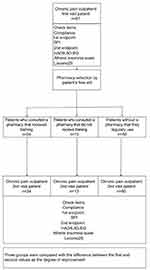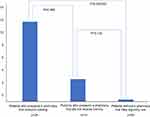Back to Journals » Integrated Pharmacy Research and Practice » Volume 8
Hospital–pharmacy cooperative training and drug-taking compliance in outpatients with chronic pain: a case–control study
Authors Uejima K , Hayasaka M, Kato J, Sakata W, Otsuka S, Watanabe F, Yoshida Y, Kamei M
Received 5 December 2018
Accepted for publication 29 March 2019
Published 2 July 2019 Volume 2019:8 Pages 63—74
DOI https://doi.org/10.2147/IPRP.S197135
Checked for plagiarism Yes
Review by Single anonymous peer review
Peer reviewer comments 2
Editor who approved publication: Professor Jonathan Ling
Kentaro Uejima1,2 Masatoshi Hayasaka,1 Jitsu Kato,3 Wakako Sakata,1 Susumu Otsuka,1 Fumiyuki Watanabe,2 Yoshikazu Yoshida,1 Miwako Kamei2
1Department of Pharmacy, Nihon University Itabashi Hospital, Tokyo, Japan; 2Nihon University School of Pharmacy, Funabashi-shi, Chiba, Japan; 3Department of Pharmacy, Nihon University Itabashi Hospital, Tokyo, Japan
Purpose: Chronic pain is a common symptom that is suffered by 20% of the overall population in Japan. Although pharmacotherapy is critical for the treatment of chronic pain, there are no reports on the pharmacies. In the present study, we examined the effect of hospital–community pharmacy cooperative training on improving drug-taking compliance, pain relief, anxiety, insomnia, and motor function in patients with chronic pain.
Patients and methods: The subject sample included 87 patients with chronic pain who were examined for the first time at the outpatient services department of Nihon University Itabashi Hospital. Patients were interviewed to obtain information regarding drugs used before and after the treatment, habitually used community pharmacies, presence of cooperative training with Itabashi Hospital, drug-taking compliance, and side effects. We compared treatment outcomes before and after consultation using the Brief Pain Inventory (BPI), Hospital Anxiety and Depression Scale (HADS), EuroQol Group measure (EQ-5D) for quality of life, Athens Insomnia Scale, and Locomo 25 scale for motor function.
Results: In patients who used community pharmacies that perform training, drug-taking compliance was significantly better, and a significant improvement was observed in the scores of BPI, HADS Anxiety, Athens Insomnia, and Locomo 25.
Conclusion: Pharmacotherapy is essential for the treatment of chronic pain. To this end, appropriate drugs with proper drug management guidance are indispensable. In this study, the use of community pharmacies that have undergone cooperative training with hospitals improves pain and anxiety. This is achieved through proper drug management guidance, shared awareness of drug information, and achievement of better drug-taking compliance. To improve the quality of treatment for chronic pain, involvement of community pharmacies such as by providing accurate information is essential. In the future, expanding cooperative training with hospitals may further help reassure patients, facilitate drug-taking, and improve the quality of treatment for chronic pain.
Keywords: chronic pain, community pharmacies training, drug management guidance, patient compliance
Background
Chronic pain was reported to affect 17 million people in 2004 and over 23 million people in 2012 in Japan, indicating that it is a common symptom that is progressively increasing.1
The 2017 revised International Classification of Diseases 11 (ICD-11) of the World Health Organization classifies chronic pain into eight subcategories—1) chronic primary pain, 2) chronic cancer pain, 3) chronic posttraumatic and postsurgical pain, 4) chronic neuropathic pain, 5) chronic headache and orofacial pain, 6) chronic visceral pain, 7) chronic musculoskeletal pain, and 8) chronic nociceptive pain.2 Chronic pain takes a long time to improve; therefore, it is vital for treatment to aim at improving pain as well as activities of daily life (ability to perform ADL).3 In Japan, however, 72.4% of patients with chronic pain discontinue treatment, and most are unsatisfied with the treatment outcomes.4 At present, there is no satisfactory treatment for chronic pain. Reasons of low satisfaction levels are reported to be decreased ability to perform ADL in addition to pain. Therefore, while pain relief is indispensable for treatment outcomes in chronic pain, other factors need to be improved to continue ability to perform ADL.
In Japan, treatment for chronic pain is primarily conducted on an outpatient basis.5 Pharmacotherapy is the principal treatment method for chronic pain; drugs used for pain relief include nonsteroidal anti-inflammatory drugs (NSAIDs), acetaminophen, and various other drugs including antianxiety agents, antidepressants, and anticonvulsants. When patients are not provided accurate information for analgesics, it may cause unease, affect drug-taking compliance, and lead to treatment discontinuation. However, many community pharmacists in Japan do not have the opportunity to learn about pain relief medicine, and many of analgesics are not covered by insurance in Japan, so there is no environment to learn.6 As a result, there is failure to achieve pain relief. It has been reported that the rate of pain relief for cancer pain is low among outpatients compared with that among inpatients in Japan,7 In Japan, there is not much opportunity for pharmacists to learn pharmacological action and insurance medicine after graduation.
For example, a pharmacist may explain gabapentin prescribed as an analgesic as an anticonvulsant. In addition, antidepressants prescribed as analgesics may be described as antidepressants without describing them as analgesics, which we believe is also caused by poor compliance. Therefore, proper drug management guidance is imperative for the treatment of chronic pain. To this end, community pharmacies, which are important institutions for outpatient pharmacotherapy, play a key role. Despite this, there are no reports on the influence of community pharmacies on chronic pain.
In Japan, most patients use a pharmacy near the hospital they visited because they don’t have a habit of visiting a community pharmacy.8 Therefore, it is difficult for one of community pharmacy to have appropriate information for patients. In addition, there is not enough information available about pain relief medicine in community pharmacy.9 For that reason, community pharmacies need to be involved in pain relief management, however, this is not happening. In Japan, patients tend to change community pharmacies depending on which hospitals they consulted with, and the fact that medications were prepared at multiple community pharmacies, it is difficult for one community pharmacy to have appropriate information for patients, and knowledge of pain relief medicine is also poor. Therefore, data on the current pharmacy’s pain relief supply system is poor. For community pharmacies to provide adequate drug management guidance, the prescribing institution, ie, the hospital, should share drug information, physical evaluation, and other information to understand the appropriate drug administration. The Nihon University Itabashi Hospital provides an outpatient service for chronic pain where patients receive multidisciplinary examination and treatment from nurses, community pharmacists, psychiatrists, and pain management specialists. Furthermore, the hospital conducts training three times per year to share case studies, drug information, and physical evaluations with local community pharmacies. In this report, we examined how hospital–community pharmacy cooperative training on chronic pain affects drug-taking compliance, and we also evaluate the resulting effect on pain relief, quality of life (QOL), depression, anxiety, insomnia, and motor function.
Methods
Cooperative training with hospital pharmacist and community pharmacist
The design of the present study is shown in Figure 1.
The training conducted by physicians and hospital pharmacists consisted of sharing of information on physical evaluations, drug information used in chronic pain, and case studies. Participation by community pharmacies was voluntary. Training was conducted in accordance with Guidelines for Medicinal Treatment 2014 of the Japan Palliative Medicine Society Guidelines.10 Information sharing was conducted three times per year with community pharmacies in proximity to Itabashi Hospital. Sessions lasted 2.5 hrs, and a total of six sessions were conducted over the 2-year period. Following training, questions from a community pharmacy regarding a prescription for a patient with chronic pain were addressed to the hospital pharmacist over the telephone, and appropriate guidance was given.
Participants
The subject sample included 87 patients with chronic pain who were referred to and examined at the outpatient services department for chronic pain between April 2016 and March 2018 and whose initial treatment was pharmacotherapy.
Endpoints
Primary endpoint was pain measurement of chronic pain. Chronic pain was evaluated before examination and after the second examination using the Brief Pain Inventory (BPI) for degrees of pain and quantified using the numerical rating scale (NRS) Figure 2 presents the BPI questionnaire. The BPI is the most commonly used pain measures which is copyrighted by MD Anderson Cancer Center.11 The difference between the BPI value at the first medical examination and the value at the second medical examination was evaluated as the degree of improvement.12,13
 |
Figure 2 Brief pain index questionnaire. Evaluation was performed in all patients at 11 levels based on the degree of pain and the mood and behavior disturbed by pain. Note: Copyright |
There were secondary endpoints. In addition to pain evaluation, we used the Hospital Anxiety and Depression Scale (HADS).14,15 Figure 3 shows the HADS questionnaire. The EuroQol Group measure (EQ-5D) for QOL,16,17 Athens Insomnia Scale for sleeplessness,18 and Locomo 25 scale for motor function were administered and compared. Figure 4 presents the Locomo 25 questionnaire.19,20 The difference between these values at the first medical examination and the value at these second medical examination was evaluated as the degree of improvement.
 |
Figure 4 Locomo 25 questionnaire. Locomo 25 was developed as a screening tool of locomotive syndrome by a Japanese orthopedic surgeon group in 2008. It comprises 25 questions related to musculoskeletal disorders such as walking disability, difficulty in activities of daily living, or pain in the body.Note: Translated with permission from The Japanese Orthopaedic Association. Locomo challenge. Available from: https://locomo-joa.jp/check/test/locomo25.html.20 |
Adverse events were verified as the other endpoint. The evaluation period was 1–3 months after the second examination.
When patients received prescriptions for chronic pain, we also check whether they have usual pharmacy and they were asked if there was a community pharmacy where they would like the drugs to be dispensed.
At the second examination, the actual community pharmacy where the patient went was verified, and it was determined whether that community pharmacy received training from the hospital. Furthermore, care at the community pharmacy was assessed to determine whether the drugs received by the patient were the same as what would have been dispensed by the patient’s usual community pharmacy.
To evaluate compliance, we checked a dose rate at first and second interviews. We set patients who have dose rating from 80% to 120% as a good compliance group, and other than that, we made it poor compliance group. Chi-square test and Mann–Whitney U-test were used to compare man group and female group, and Kruskal–Wallis test was used to compare the following three groups: “Patient who prepared a pharmacy that received training”, “Patient who prepared a pharmacy that did not receive training” and “Patient who do not have a preferred pharmacy” . Statistical analyses were performed using SPSS version 25 (SPSS Inc., IBM, New York, USA), and a p-value of 0.05 was considered statistically significant.
Ethical considerations
All subjects signed a written informed consent, and ethical approval was provided by the Ethical Review Board for Clinical Trials of Nihon University Itabashi Hospital. The authors confirm that the study was conducted in accordance with the Declaration of Helsinki.
Results
Among 87 patients, there was no one to interrupt from visiting a hospital by one itself.
During the study period, community pharmacists that received training questioned the hospital three times regarding opioid dose reduction and discontinuation. Adverse event included mild disorientation in one patient administered pregabalin; however, drug discontinuation was not required.
The whole training was participated by 344 community pharmacies in 651 community pharmacists in the area. There were 70 regional pharmacies visited by patients, of which 4 pharmacies were pharmacies outside the region of training.
Background of patients
Table 1 presents patient background information. The male-to-female ratio indicated that female patients were more common, which was consistent with the results of the Comprehensive Survey of Living Conditions conducted by the Japanese Ministry of Health, Labour and Welfare in 2007.21 Additionally, female patients tended to be younger. Many patients reported pain in multiple sites; pain of the lower abdomen was common, with no significant difference between male and female patients.
 |
Table 1 Patient background |
Twelve of 87 patients went to the community pharmacy closest to Itabashi Hospital; however, this was not their usual community pharmacy. Many patients had their prescription dispensed at the community pharmacy close to their home or near the train station closest to their home. Furthermore, 34 patients had their prescription dispensed at a community pharmacy that did not receive training from Itabashi Hospital, who had their prescription dispensed at the community pharmacy closest to their previous referring physician, and this was not the patient’s usual community pharmacy.
In patients with poor compliance, many patients did not take their drugs, took three times the dosage, or self-regulated the dosage. Overdose was observed in one patient due to opioid dependency.
No significant difference was observed between male and female patients in this study; however, chronic posttraumatic and postsurgical pain and chronic visceral pain tended to be more common among female patients. Regarding drugs used prior to treatment, there was no significant difference between male and female patients. The most commonly used opioid was tramadol. The most commonly used NSAID was celecoxib. There was no difference between sexes in drug-taking compliance. Following treatment at Itabashi Hospital, many patients were instructed to discontinue NSAIDs to avoid the risk of gastric mucosal injury and renal dysfunction arising from long-term usage. There was no difference between male and female patients in whether they usually go to a specific community pharmacy. Furthermore, there was no difference between male and female patients; whether having a community pharmacy, and a pharmacy which patients visited is whether cooperating together with hospitals.
Cooperative training with hospital pharmacist and community pharmacist and treatment outcomes
Community pharmacies were classified based on whether or not they performed training with hospitals, and the before and after treatment evaluation of patient compliance and pain is shown in Table 2. Patients who went to community pharmacies that received training showed good compliance with treatment.
 |
Table 2 A comparison of the pain treatment outcomes and compliance according to the presence or absence of a pharmacy regularly used and the presence or absence of training with the hospital |
BPI improvement degree of the main evaluation item is shown in Figure 5.
Figure 5 shows a comparison of the three groups for BPI, which is an indicator of pain. BPI scores improved more in patients with a habitual community pharmacy than in those without a habitual community pharmacy.
As shown in Table 3, patients were divided into three groups, including those who used a community pharmacy that received training, those who habitually used a community pharmacy that did not receive training, and those who did not have a preferred community pharmacy. HADS Anxiety, Athens Insomnia Scale Locomo 25 were tended to be better for patients who used a community pharmacy that received training than for those in the other groups.
 |
Table 3 A comparison of the treatment outcomes according to the presence or absence of a pharmacy regularly used and the presence or absence of training with the hospital |
Discussion
This study revealed that treatment at an outpatient clinic for chronic pain showed effects comparing pre- and post-treatment, regardless of the presence or absence of hospital–community pharmacies training. However, in community pharmacies that receive training, the rate of drug-taking compliance is higher, and there is a difference in the improvement in pain, anxiety, motor function, and sleep. We believe that training helps pharmacists at community pharmacies obtain accurate information. Obtaining proper drug-taking management guidance reduces patient anxiety and improves drug-taking compliance. As a result, better drug-taking compliance improves pain relief, and consequently motor function and sleep. In Japan, many pharmacies provide a written and verbal explanation of pharmaceuticals, and the written explanation follows a common template.22 This template often does not include an explanation of antidepressants or antianxiety drugs used as analgesics for chronic pain. Because some drugs used for chronic pain are not covered by health insurance in Japan, community pharmacies may not have sufficient knowledge of pharmacotherapy for chronic pain, and the purpose of the prescribed drugs is not fully understood. This may lead to patient anxiety and noncompliance; however, it is thought that cooperative training with hospitals and awareness of the results of physical evaluations helps to determine the purpose of the prescribed drugs. This provides appropriate drug management guidance for community pharmacies.
HADS scores for anxiety show an improvement in pain through appropriate drug management guidance; however, sufficient improvement may not be seen in patients with depression. Therefore, in patients with depression, we believe that the involvement of the department of psychiatry is important for the treatment of chronic pain. Regarding QOL, although it tends to improve, there is no significant difference in patients who do and do not consult a community pharmacy that receives training. This is believed to be a result of the short evaluation period between the initial and second community pharmacy visit. Although BPI improves, the improvement is not substantial. When comparing the first and second scores, it is suggested that the improvement in BPI may not be enough to improve QOL. We believe that long-term evaluation is needed.
In the treatment of chronic pain, pharmacotherapy is considered important. Naturally, pharmacotherapy requires the use of drugs, and there are various reasons for patient noncompliance. Overdosing, dose self-regulation, and self-determined cessation of medication are factors that hinder treatment, and these actions can be harmful. Proper treatment of chronic pain requires accurate understanding by the patient about the risk of overdose as well as an understanding of appropriate drug-taking. To this end, outpatient drug-taking management guidance by a community pharmacist is important. Patients who use community pharmacies that receive training experience greater pain relief than patients with and without a specific community pharmacy that they regularly go to. This suggests that in patients who go to community pharmacies that do not receive training, compliance is poor with no improvement in anxiety. Therefore, it is possible that drug-taking management guidance is inadequate when simply receiving guidance from one’s regular community pharmacy. Pharmacotherapy is crucial for the treatment of chronic pain; however, it is also very important to evaluate the conditions that contribute to problematic patient self-determination. This includes assessing whether the patients are taking their medication properly, even when they receive checkups at the hospital, and whether they experience anxiety. In such evaluations, community pharmacies have a major role.
Improvement in pain-related patient anxiety, motor function, and sleep may be attributed to shared knowledge of physical evaluation results and pharmaceutical knowledge between the hospital and community pharmacy. Additionally, this relationship helps to improve patient drug-taking compliance through appropriate drug-taking management guidance for analgesics based on physical evaluation and the prescription, indicating that the patient has chronic pain.
This result could be divided depending on whether patients usually use it or not in the same community pharmacy, but this time, all the patients who visited the pharmacy that we normally use were trained.
In the present study, the number of community pharmacies that perform training with the hospital exceeds the number of community pharmacies that do not perform training, and it is suggested that the latter provide inadequate drug-taking management guidance because they have inadequate knowledge. When community pharmacists do not fully understand analgesics, they cannot grasp the purpose of the prescribed drugs, which leads to patient anxiety, and consequently less effective treatment. Therefore, we believe that having pain evaluations and pharmaceutical knowledge shared between hospitals and community pharmacies that deal with chronic pain (ie, training with hospitals that treat chronic pain and community pharmacies) will create a cooperation-friendly environment and lead to better therapeutic outcomes for patients with pain. In Japan, it is thought that patients need to have a habitual community pharmacy. In the factual survey report that describes “the vision of community pharmacies for patients” by the Ministry of Health, Labour and Welfare, one-half of patients do not habitually use a particular community pharmacy. Some reports indicate that only 10–20% of patients have a habitual community pharmacy.23,24 This shows that in Japan, it is considered extremely important to first instruct patients to obtain a regular community pharmacy. Even if the number of community pharmacies that perform training has increased, patients still need to have the habit of always using the same facility. The Ministry of Health, Labour and Welfare recommends promoting the habitual use of community pharmacies. It is expected that this will lead to improved safety and efficacy of pharmacotherapy for patients, as well as improve compliance, which will reduce the number of unused drugs and optimize medical costs.25 In the present study, having a habitually used community pharmacy and having those pharmacies receive training with hospitals affect pain relief. This clear advantage for the patient may lead to the habitual use of a community pharmacy. In the future, if the number of cooperating community pharmacies is increased and the evaluation period prolonged, we expect that QOL will be positively affected.
Conclusion
In summary, we found that appropriate training of community pharmacists in collaboration with hospitals improved patient anxiety toward drug administration and alleviated pain through improved compliance; this consequently improved the Locomo 25 and Athens Scale scores. However, the improvement was not broadly achieved. Therefore, further long-term observation is warranted to determine the extent of improvement and determine whether the QOL improves.
Disclosure
The authors report no conflicts of interest in this work.
References
1. Yabuki S. A nationwide survey of chronic pain sufferers in Japan: pain in Japan since 2010. J JPN Clinl Orthop Assoc. 2012;47(2):127–134.
2. Treede RD, Rief W, Barke A, et al. A classification of chronic pain for ICD-11. Pain. 2015;156(6):1003–1007. doi:10.1097/j.pain.0000000000000160
3. The Japanese Ministry of Health, Labour and Welfare: Guidelines for the treatment of chronic pain using medical narcotics; 2012 p 9.
4. Ogawa S. A large-scale survey on chronic pain and neuropathic pain in Japan. J JPN Clinl Orthop Assoc. 2012;47(6):565–574.
5. Harroti S. The prevalence of chronic pain in Japan. J JPN Pharml Soc. 2006;127(3):176–180.
6. Harikae H. Research on pain control in cancer outpatients taking opioids dispensed by community pharmacies. J. Pharm. Health Care Sci. 2008;34(2):156–164. Available from: https://www.jstage.jst.go.jp/article/jjphcs/34/2/34_2_156/_pdf/-char/ja. Accessed May 20, 2019.
7. Sakakibara N. The state and problems of pain in cancer patients – comparing inpatients vs outpatients, and focusing on elderly patients. Palliative Care Res. 2015;10(2):135–141. doi:10.2512/jspm.10.135
8. Kizaki K. From how many medical institutions did the patient bring to one pharmacy? – routine evaluation by the ‘family physician’ providing drug-taking management from the perspective of the pharmacy. JPN J Pharm Healthcare Sci. 2017;43(2):55–62.
9. Kato T. Efforts for palliative care at health pharmacy. JPN J Pharm Palliative Care Sci. 2009;2:139–143.
10. Japanese Society for Palliative Medicine. Clinical Guidelines for Cancer Pain Management.
11. Ceeland CS. The brief pain inventory user guide. Available from: https://www.mdanderson.org/documents/Departments-and-Divisions/Symptom-Research/BPI_UserGuide.pdf
12. Cleeland CS, Ryan KM. Pain assessment: global use of the brief pain inventory. Ann Acad Med Singapore. 1994;23(2):129–138.
13. Hawker GA, Mian S, Kendzerska T, French M. Measures of adult pain: Visual Analog Scale for Pain (VAS Pain), NRS for Pain (NRS Pain), McGill Pain Questionnaire (MPQ), Short-Form McGill Pain Questionnaire (SF-MPQ), Chronic Pain Grade Scale (CPGS), Short Form-36 Bodily Pain Scale (SF-36 BPS), and Measure of Intermittent and Constant Osteoarthritis Pain (ICOAP). Arthritis Care Res. 2011;63(11):240–252.
14. Zigmond AS, Snaith RP. The hospital anxiety and depression scale. Acta Psychiatr Scand. 1983 Jun;67(6):361–370.
15. Kugaya A. Screening for psychological distress in Japanese cancer patients. Jpn J Clin Oncol. 1998 May;28(5):333–338.
16. Barrett JE, Barrett JA, Oxman TE, Gerber PD. The prevalence of psychiatric disorder in a primary care practice. Arch Gen Psychiatry. 1998;45:1100–1106. doi:10.1001/archpsyc.1988.01800360048007
17. Brooks R. EuroQol: the current state of play. Health Policy. 1996;37(1):53–72.
18. Arber S, Bote M, Meadows R. Gender and socio-economic patterning of self-reported sleep problems in Britain. Soc Sci Med. 2009;68(2):281–289. doi:10.1016/j.socscimed.2008.10.016
19. Wada Y, Sakuraba K, Kubota A. Effect of the long-term care prevention project on the motor functions and daily life activities of the elderly. J Phys Ther Sci. 2015;27:199–203. doi:10.1589/jpts.27.199
20. The Japanese Orthopaedic Association. Locomo challenge. Available from: https://locomo-joa.jp/check/test/locomo25.html. Accessed December 4, 2018.
21. The Japanese Ministry of Health, Labour and Welfare. Outline of the 2007 comprehensive survey of living conditions; 2007 Available from: https://www.mhlw.go.jp/english/database/db-hss/cslc-index.html.
22. Murohara M. Collaborative study on drug information for patients: efficacy of the patient drug information. J JPN Soc Hosp Pharma. 1992;18(3):236–244. doi:10.5649/jjphcs1975.18.236
23. The Japanese Ministry of Health, Labour and Welfare: Factual survey report of ‘the vision of pharmacies for patients’; 2017.
24. Hayashi S. Comparison of viewpoints and awareness between patients with and without a ‘family pharmacy’. Yakugaku Zasshi. 2006;126(2):123–131.
25. The Japanese Ministry of Health, Labour and Welfare: Promotion of family pharmacist and pharmacy; 2017.
 © 2019 The Author(s). This work is published and licensed by Dove Medical Press Limited. The full terms of this license are available at https://www.dovepress.com/terms.php and incorporate the Creative Commons Attribution - Non Commercial (unported, v3.0) License.
By accessing the work you hereby accept the Terms. Non-commercial uses of the work are permitted without any further permission from Dove Medical Press Limited, provided the work is properly attributed. For permission for commercial use of this work, please see paragraphs 4.2 and 5 of our Terms.
© 2019 The Author(s). This work is published and licensed by Dove Medical Press Limited. The full terms of this license are available at https://www.dovepress.com/terms.php and incorporate the Creative Commons Attribution - Non Commercial (unported, v3.0) License.
By accessing the work you hereby accept the Terms. Non-commercial uses of the work are permitted without any further permission from Dove Medical Press Limited, provided the work is properly attributed. For permission for commercial use of this work, please see paragraphs 4.2 and 5 of our Terms.



